
Local SEO is a Search Engine optimization part, like putting your business on Google or any search engine map. It's a smart SEO approach that boosts your visibility in local search results this will help you to make your shop and service digitally. This will help you to attract the most local customers for your service or products.
Local SEO Task
• Finding Local Keywords
• Optimize Your Website and Google My Business Profile
• Create Citation (NAP)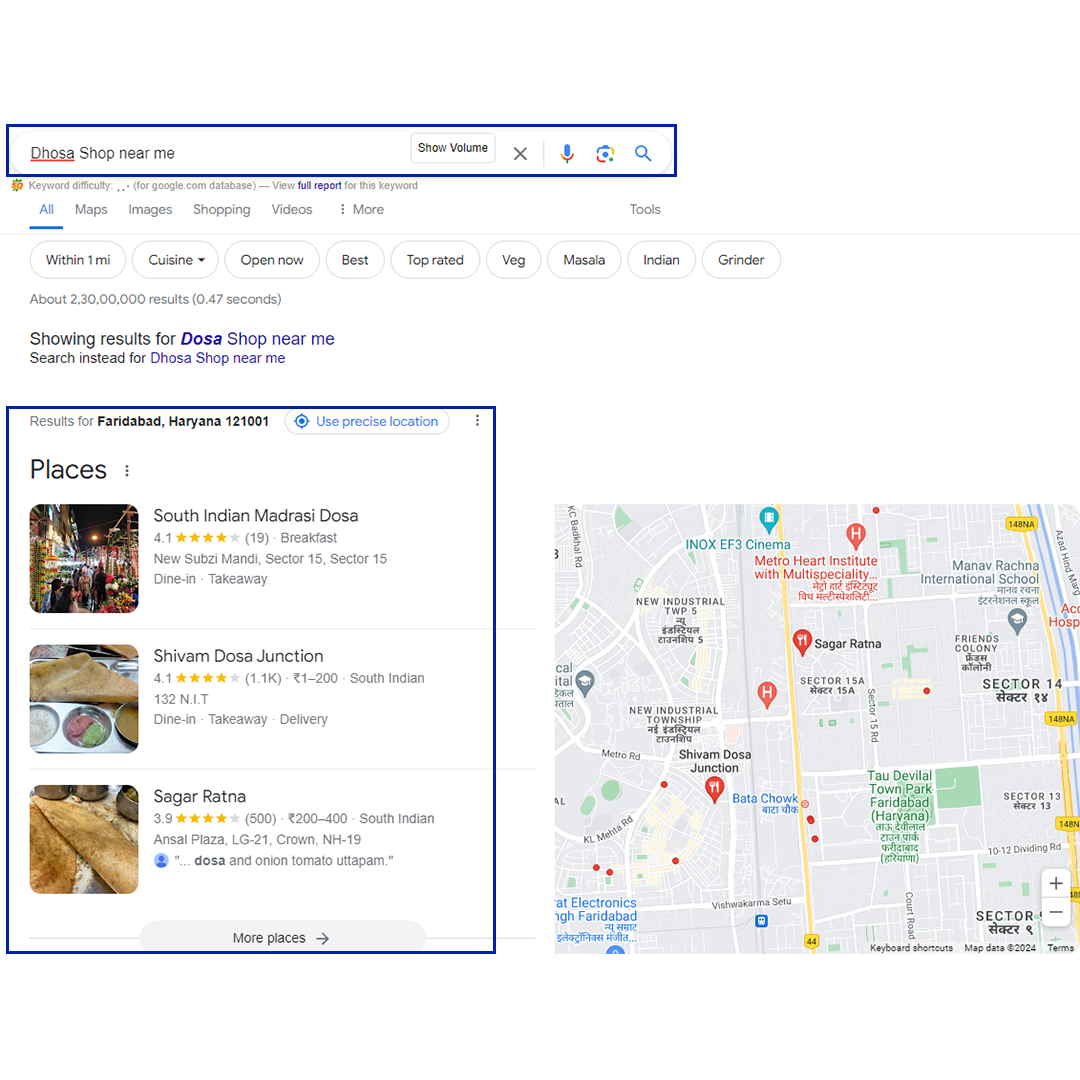
Whether you run a normal shop, a restaurant, a medical or food stall, or offer services in a specific area, local SEO helps people nearby find you easily online. Local SEO involves applying lots of techniques and strategies to improve a business's digital presence and increase its chances of getting more attractive customers in your local shop.
Local SEO is helping lots of businesses to connect with their target audience/customers in their nearby local area. Most people repeat search engines to find their local products and services so that businesses that can optimize their brand for local SEO and their online presence for local search results have a higher chance of attracting customers.
Local SEO helps companies increase their visibility in local search results, drive more website traffic, generate leads, and boost conversions. This will also help small businesses get more customers online and those with physical locations for selling their products and services, such as local stores, restaurants, medical, and service-based companies.
Note: If you Want to Create Your Local Business, You can talk with Dixinfotech about this.
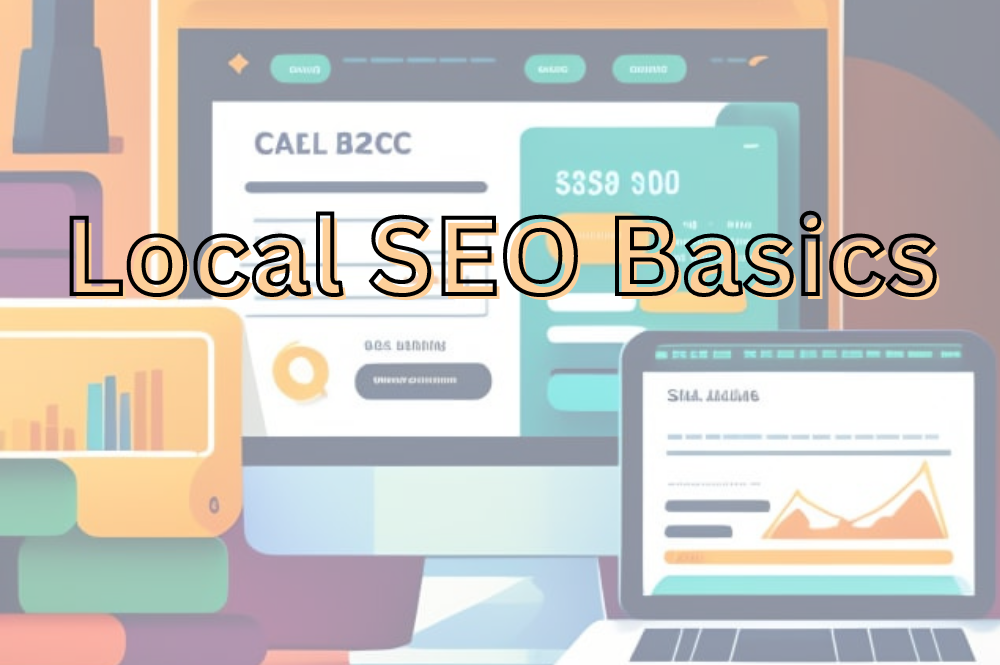
Local Search helps people to find products and services online in the best and compare prices also they can compare the distance between all the shops. For example, when someone searches for "restaurants near me" or "plumbers in Gurgaon," they are searching this on Google, then Google shows them location-specific results. Search engines first aim to provide relevant results, so if your search is location specific, they show results to users based on their search queries and location data.
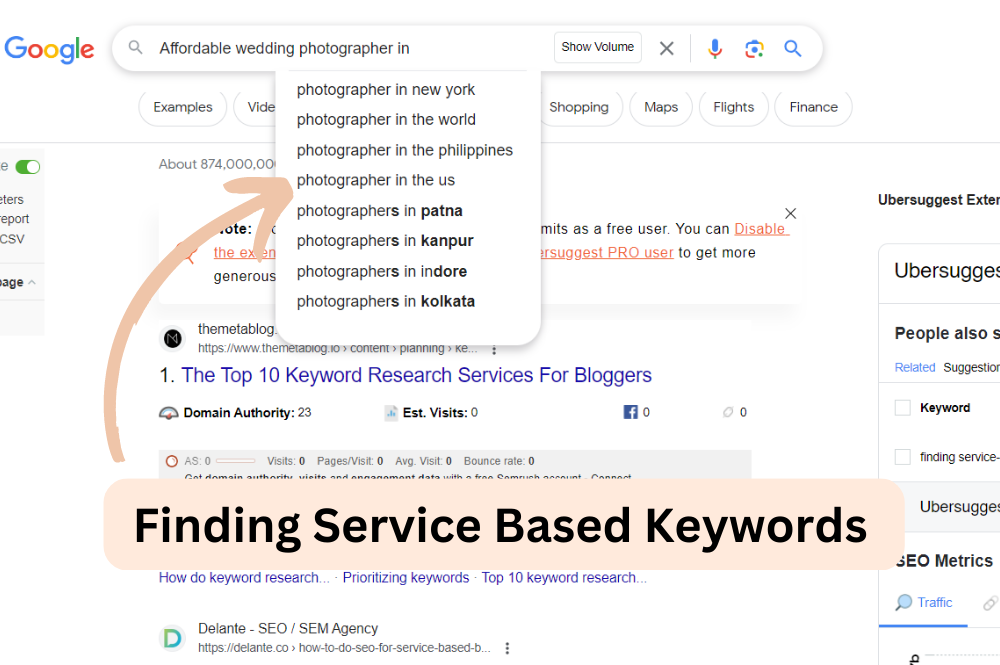
Targeting relevant keywords is crucial for local SEO success. It helps businesses align their website content with the search queries potential customers use to find local products or services. By targeting the right keywords, businesses can increase their visibility in local search results and attract highly targeted traffic.
Keyword research involves identifying the search terms and phrases that potential customers are likely to use when looking for products or services offered by a business. For local SEO, it is important to consider location-specific keywords that incorporate the business's target location.
Businesses should identify keywords that are directly related to the products or services they offer. For example, a plumber in New York City may target keywords such as "emergency plumber NYC," "residential plumbing services in NYC," or "clogged drain repair in NYC."
Several keyword research tools can assist businesses in finding relevant keywords for local SEO. Some popular tools include:
Google Keyword Planner : This free tool provides keyword ideas, search volume data, and helps identify location-specific keywords.
Moz Keyword Explorer : Moz's tool offers keyword suggestions, search volume, difficulty scores, and additional insights to help businesses find valuable keywords.
SEMrush : SEMrush provides comprehensive keyword research features, including search volume, keyword difficulty, competitive analysis, and keyword trend data.
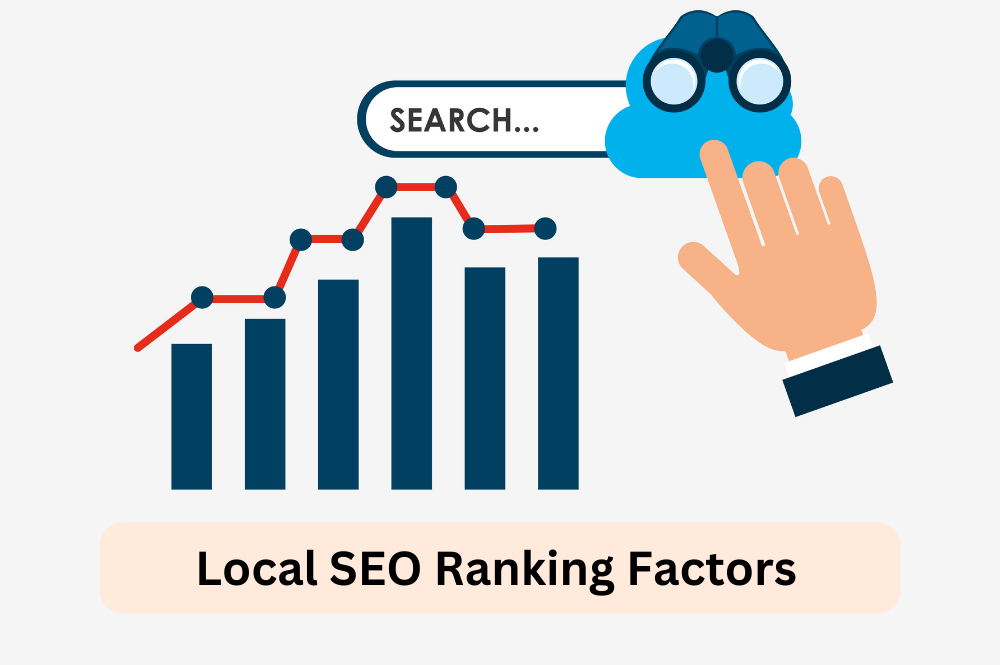
Several factors influence a business's local search rankings. These factors include relevance, distance, and prominence. Relevance refers to how well a business's listing matches a user's search intent. Distance refers to the proximity of the business to the user's location. Prominence refers to the business's overall visibility, reputation, and online presence.
On-page optimization involves optimizing various elements on a website, such as meta tags, headings, content, and URLs, to align with local search queries. Including location-specific keywords, adding structured data markup, and optimizing page titles and descriptions can improve local search visibility.
Off-page factors include external signals that impact a business's local search rankings. These factors include the quantity and quality of local citations, backlinks from reputable websites, social signals, and online reviews.
Online reviews and ratings from customers play a significant role in local SEO. Positive reviews can improve a business's reputation, increase trust among potential customers, and boost local search rankings.
Ensuring consistent and accurate NAP information across all online platforms and directories is crucial. Inconsistent NAP data can confuse search engines and affect a business's local search rankings negatively.
Building high-quality local backlinks from authoritative websites and local directories can improve a business's local search visibility. This can be achieved through partnerships, collaborations, sponsorships, and content creation that attracts local links.
Social signals, such as engagement on social media platforms, can indirectly influence a business's local search rankings. Active social media presence, positive customer interactions, and sharing location-specific content can enhance local SEO efforts.
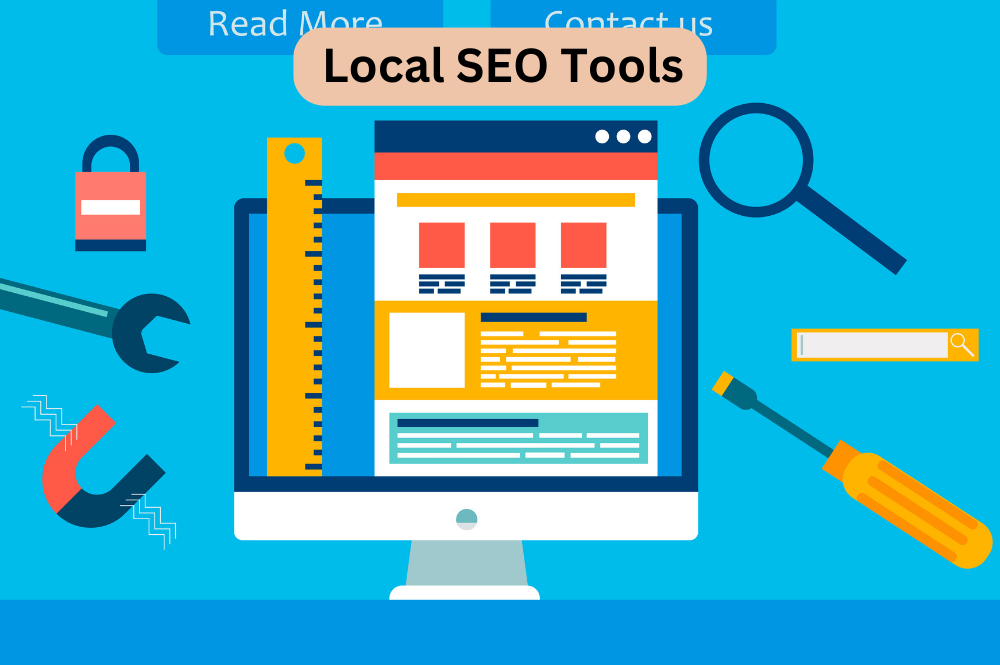
Local SEO tools are software or online platforms designed to assist businesses in optimizing their local search visibility and managing their local SEO efforts effectively. These tools provide valuable insights, data, and functionalities to enhance a business's local online presence and monitor its performance in local search results.
Utilizing local SEO tools can offer several benefits for businesses:
Data and insights: Local SEO tools provide valuable data and insights about a business's online visibility, rankings, website traffic, local competition, and customer reviews. This data helps businesses make informed decisions and identify areas for improvement.
Efficiency and automation: Local SEO tools streamline various processes and tasks, saving time and effort. They automate tasks such as citation building, review monitoring, keyword tracking, and reporting, allowing businesses to focus on other critical aspects of their operations.
Competitive advantage: By leveraging local SEO tools, businesses can gain a competitive edge. These tools provide insights into competitors' strategies, keywords, and performance, allowing businesses to adjust their own strategies accordingly.
Google My Business Insights: Google My Business (GMB) Insights is a built-in tool provided by Google for businesses with a GMB listing. It provides valuable data on customer actions, search queries, and local search visibility. Businesses can gain insights into how customers find and interact with their GMB listing.
BrightLocal: BrightLocal offers a suite of local SEO tools for businesses, agencies, and SEO professionals. It provides tools for citation building and management, local rank tracking, online review monitoring, local search audit, and Google My Business optimization.
Moz Local: Moz Local helps businesses manage their online listings and citations across various platforms. It ensures accurate NAP information, monitors local search performance, and provides insights into improving local SEO efforts.
Whitespark: Whitespark specializes in local search software and services. Its tools include local citation finder, rank tracker, reputation builder, and review management. Whitespark also offers services for citation building and local search audit.
ReviewTrackers: ReviewTrackers focuses on online reputation management and review monitoring. It helps businesses gather, analyze, and respond to customer reviews across different platforms, improving reputation and customer engagement.
Reputation.com: Reputation.com offers a comprehensive platform for managing online reputation, customer reviews, and business listings. It helps businesses monitor and respond to reviews, improve ratings, and optimize their online presence for local search.
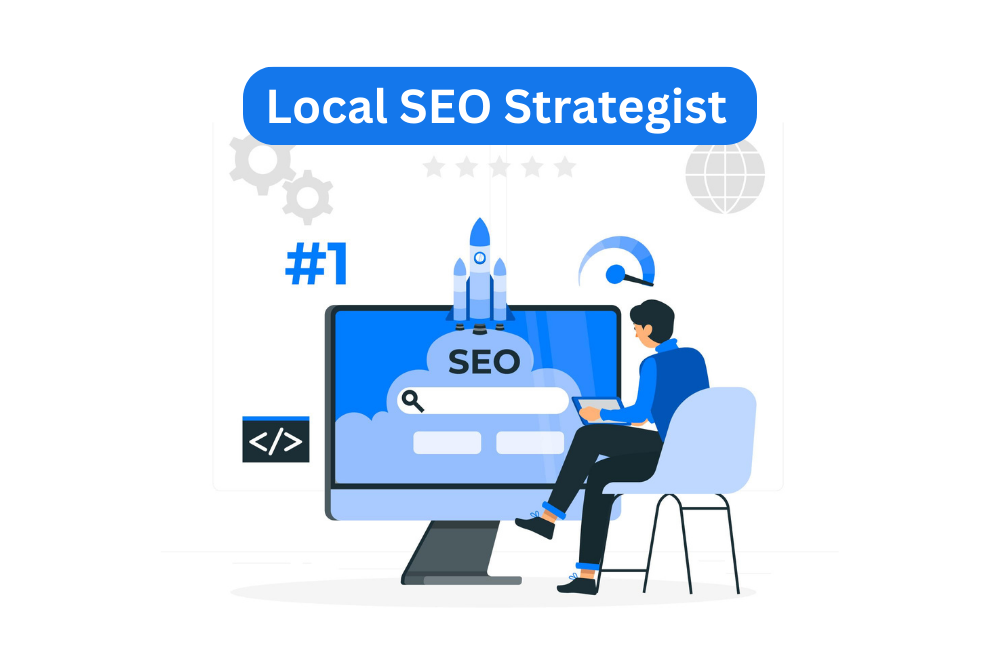
A local SEO strategist plays a crucial role in planning, implementing, and managing an effective local SEO strategy for businesses. They understand the nuances of local search and utilize their expertise to improve a business's local online visibility, attract targeted traffic, and drive conversions. A local SEO strategist helps businesses stay ahead of the competition, navigate algorithm updates, and maximize their local SEO efforts.
A successful local SEO strategist possesses the following skills and expertise:
In-depth knowledge of local search: A deep understanding of how local search works, including ranking factors, local intent, and local search algorithms, is essential.
Technical SEO expertise: Proficiency in technical SEO aspects such as website optimization, structured data markup, URL structures, mobile optimization, and site speed is crucial.
Keyword research and targeting: The ability to conduct thorough keyword research, identify relevant local keywords, and strategically incorporate them into the content and optimization efforts.
Analytics and data analysis: Proficiency in using analytics tools to monitor and analyze data, interpret insights, and make data-driven decisions.
Local citation and listing management: Understanding the importance of consistent and accurate NAP information across various platforms and directories, and managing local citations effectively.
Content development and optimization: Creating compelling, location-specific content that aligns with local search intent and optimizing it for search engines and users.
A local SEO strategist typically carries out the following responsibilities:
To develop an effective local SEO strategy, the following best practices should be considered:
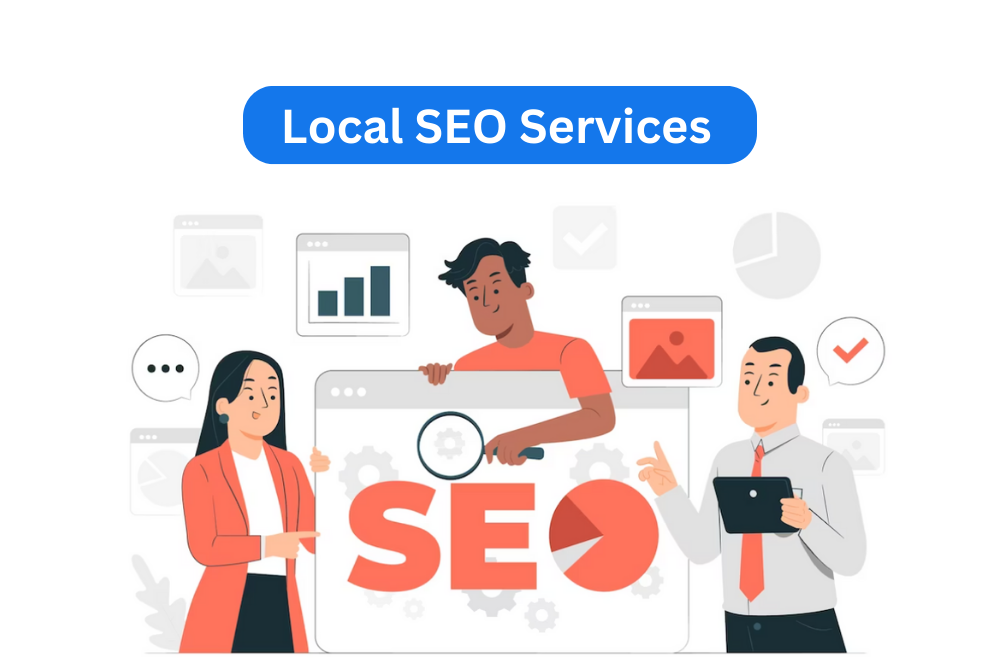
Local SEO services are offered by professional agencies or consultants who specialize in optimizing businesses' online presence for local search. These services encompass various activities and strategies aimed at improving local search rankings, increasing website traffic, and attracting local customers.
Hiring a professional local SEO service provider offers several advantages for businesses:
Expertise and knowledge: Local SEO professionals have the expertise and knowledge to implement effective strategies and stay updated with the latest industry trends and algorithm changes.
Time and resource-saving: Outsourcing local SEO tasks to professionals allows businesses to focus on their core operations while leaving the intricacies of local SEO to the experts.
Comprehensive approach: Professional local SEO services encompass a wide range of activities, including website optimization, content creation, citation building, review management, and analytics. They provide a holistic approach to improving local search visibility.
Access to tools and technology: Local SEO service providers have access to advanced tools, analytics platforms, and resources that may not be readily available to businesses internally.
Local SEO service providers offer a variety of services tailored to businesses' specific needs. Common services include:
Website optimization: Auditing and optimizing website elements such as meta tags, headings, URLs, and content to align with local search intent.
Google My Business optimization: Creating, optimizing, and managing Google My Business listings to improve visibility in local search results.
Citation building and management: Creating accurate and consistent business citations on relevant directories and platforms to enhance local search visibility.
Local link building: Implementing strategies to acquire high-quality backlinks from local sources, directories, and partner websites.
Content creation and optimization: Developing location-specific, informative, and keyword-rich content that resonates with the target audience and aligns with local search queries.
Review management: Monitoring and managing online reviews, responding to customer feedback, and improving reputation and credibility.
When choosing a local SEO service provider, businesses should consider the following factors:
Experience and expertise: Look for a service provider with a proven track record and expertise in local SEO strategies.
Client testimonials and references: Request references or read testimonials from previous clients to gauge the provider's performance and client satisfaction.
Customization and scalability: Ensure that the service provider can tailor their services to meet your specific business goals and can scale their strategies as your business grows.
Transparency and reporting: Look for a provider that offers transparent reporting, regular updates, and clear communication about the progress and results of their local SEO efforts.
Pricing and value for money: Consider the pricing structure of the service provider and evaluate the value they provide in relation to the cost.
Industry knowledge and local market understanding: Look for a service provider that understands your industry and has a deep understanding of the local market you operate in.
Assigning keywords to relevant website pages involves identifying the target keywords and strategically placing them on the appropriate pages. Each page should target specific keywords that align with its content and purpose.
Page titles, headings (H1, H2, etc.), and meta descriptions should include relevant keywords to improve their visibility in local search. These elements should accurately describe the page's content and entice users to click.
Incorporating keywords in URL structures can contribute to better search visibility. The URLs should be descriptive, concise, and include relevant keywords, making it easier for search engines and users to understand the page's content.
Each website page should have unique and informative content that aligns with the assigned keywords. The content should be valuable, well-written, and optimized with keywords naturally to provide a positive user experience and improve search rankings.
By effectively assigning keywords to pages, optimizing page elements, and creating valuable content, businesses can enhance their local search visibility and attract relevant traffic to their website.
User intent refers to the underlying motivation or purpose behind a user's search query. In local search, understanding user intent is crucial for businesses to deliver relevant and valuable content to their target audience. User intent in local search often revolves around finding local businesses, services, or information specific to a particular location.
To identify local intent keywords, businesses should consider search queries that include location-specific terms or phrases. For example, keywords like "restaurants near me," "plumber in [city name]," or "best coffee shop in [location]" indicate clear local intent. Analyzing keyword research data, customer inquiries, and frequently searched terms can help businesses identify local intent keywords relevant to their industry and target location.
Analyzing SERPs for local intent keywords is important to understand the competition and the types of results displayed. Businesses should examine the local pack (the map and business listings), the organic search results, and any featured snippets or other relevant content. This analysis helps in tailoring the content and optimizing the website for better visibility in local search results.
Google's "People Also Ask" (PAA) feature provides insights into the common questions and related queries that users have about a particular topic. Utilizing the PAA feature can help businesses understand additional local intent keywords and the specific information that users are seeking. This information can be used to create content that directly addresses these queries and improves visibility in local search.
Assessing search volumes is essential for understanding the potential reach and demand for specific keywords. It helps businesses identify popular search terms and prioritize their optimization efforts. By targeting keywords with higher search volumes, businesses can potentially attract more organic traffic and reach a larger audience.
Keyword research tools like Google Keyword Planner, Moz Keyword Explorer, and SEMrush provide valuable data on search volumes. These tools offer insights into how often specific keywords are searched and their relative popularity. By using these tools, businesses can identify keywords with higher search volumes that are relevant to their local audience.
While high search volume keywords may indicate greater potential reach, businesses should also consider the level of competition for those keywords in their local market. Highly competitive keywords may be challenging to rank for, especially if the business operates in a competitive industry or location. Balancing search volume with the level of local competition is important to choose keywords that are both popular and achievable.
Long-tail keywords are more specific and usually consist of three or more words. They often have lower search volumes but are highly targeted and have higher conversion potential. Businesses can target long-tail keywords that include location-specific terms to capture users who are looking for specific local services or products. These keywords can be less competitive and provide opportunities for businesses to rank higher in local search results.
By assessing search volumes, understanding local competition, and targeting both high-volume keywords and long-tail keywords, businesses can optimize their content effectively to meet the needs of their local audience and improve their visibility in local search.
Any business that serves customers in specific geographic areas can benefit from local SEO.
Local SEO can improve your visibility in local search results, drive targeted traffic, increase brand awareness, and boost conversions.
The best time to use local SEO is when you want to target customers within specific geographic areas.
Local SEO is important because it helps businesses connect with local customers who are actively searching for their products or services, resulting in increased visibility, traffic, and conversions.
The benefits of using local SEO include increased visibility in local search results, targeted traffic, improved brand awareness, higher conversion rates, and a competitive advantage over businesses that do not optimize for local search.
Any business that wants to attract customers from specific geographic areas needs local SEO.
Local SEO works by optimizing your online presence, including your website, Google My Business listing, online reviews, and local citations, to increase your visibility in local search results.
To dominate local SEO, businesses should focus on optimizing their website, Google My Business listing, online reviews, and local citations. They should target relevant local keywords, provide valuable local content, actively manage online reviews, and build strong relationships with local websites for link building.
For beginners, local SEO involves optimizing your website with local keywords, creating and optimizing your Google My Business listing, managing online reviews, building local citations, and targeting location-specific content. Conducting keyword research, utilizing local SEO tools, and monitoring your local rankings and performance are also important for beginners.
To do local SEO for multiple locations, it's crucial to create individual landing pages or sections on your website for each location. Optimize these pages with location-specific keywords, content, and meta tags. Additionally, optimize each Google My Business listing for each location and manage local citations and reviews separately. Consistency in NAP (Name, Address, Phone number) information across locations is vital for local SEO success.